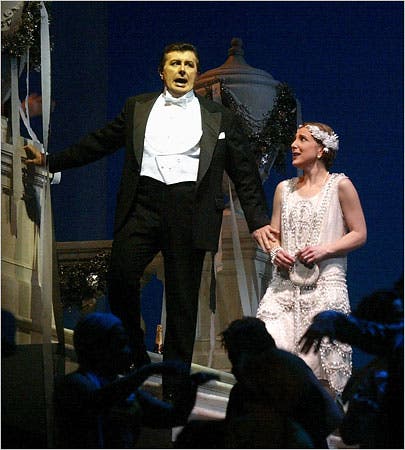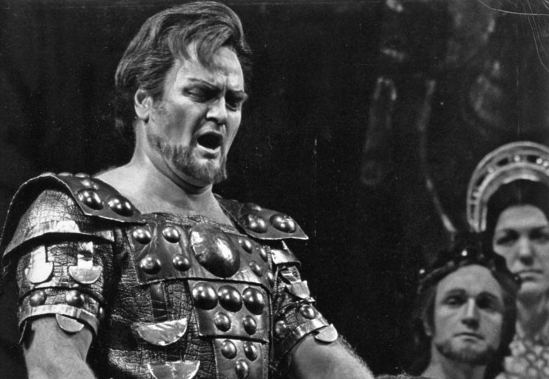OPRY
LINKS 10: Grab-Bag


Jerry Hadley
Jon Vickers
Saturdee Opry Links Overture
“Ascanio in Alba,” by Mozart.
https://www.youtube.com/watch?v=5-ZP8VccnKQ
1.
An aria for our time. Really. How badly we need an Andrea Chenier to
denounce the unfeeling rich, the economic fascists who are so cynically,
callously ruining societies and ecosystem, pulling the rope up after them.
This is a grand moment from Giordano's opera, "Andrea Chenier," inspired by
the life of the French poet executed during the French Revolution. Listen to
the resolve, the strength, the defiance, in the singing of Franco Corelli.
He meant every word. "Un dì, all'azzurro spazio." "One day I looked to the
blue sky. . ."
Synopsis: At a hoity-toity Parisian soiree, The Countess of Coigny asks
Andrea Chénier to improvise a poem, as one would request a parlor trick.
Disgusting, Chenier says that inspiration has abandoned him. The Countess's
daughter, Ivanka---I mean, Maddelena---asks Chénier to recite a verse, but
he refuses her also, saying that "Fantasy is not commanded on cue!" The
laughter of the girls draws the Countess' attention, and Maddelena explains
mockingly that the Muse of poetry is absent from the party. Chénier, roiling
with anger, improvises a poem about the suffering of the poor, ending with a
tirade against those in power in church and state, shocking the guests.
Maddalena begs forgiveness.
https://www.youtube.com/watch?v=mAxaOyIAISY
Translation:
http://www.aria-database.com/search.php?individualAria=49
2.
"Cosi Fan Tutte," like many Mozart operas, is a manic procession of manic
people doing manic things. Well, at least it seems that way if you are
possessed of the type of brain I have (and I hope you are not.) I generally
have to ignore the Marx-Brothers-on-meth plots and enjoy the procession of
one gorgeous melody after another. Here is one such melody, the tenor aria,
"Un'aura amorosa," sung by the tragically late Jerry Hadley.
https://www.youtube.com/watch?v=0BFVGBjij6g
Synopsis: Guglielmo complains of his hunger but, in this aria, Ferrando
tells him he should hold his appetite, for even the possibility of love from
their beloveds will sate one's hunger at once.
Translation:
https://www.opera-arias.com/mozart/cosi-fan-tutte/un-aura-amorosa/
3.
"If only I could forget everything. . .But all struggles are in vain," sings
Federico in "L'Arlesienne," by Cilea. Well, not quite, Federico---the
struggle to forget everything ends in triumph for everyone! Oh, sorry for
the cynicism, folks, but you know me. Anyhow, here is the magnifico, molto
luttuoso (look it up) "Lamento di Federico." Sung here by the too often
overlooked tenor, Jon Vickers. Note: this performance is marked by
scrupulous restraint, no over-emoting or "sob" factor very common in Italian
tenor singing. It's a matter of taste, and Vickers was a man who adhered to
the note. To that extent, this performance is exemplary.
https://youtu.be/CjpGohxUjVk
Synopsis: Federico has run away from home after finding out that his beloved
girl from Arles has betrayed him with the stable boy. He is found by
Baldassarre and L'Innocente but the former leaves to tend the flocks and the
latter falls asleep. As L'Innocente falls asleep, he mentions a line from a
story told earlier about a goat. This comment sets off Federico and he
despairs over his lost love.
Translation:
http://www.aria-database.com/search.php?individualAria=1119
And here, for contrast, is the great Mario Lanza with the more emotional,
tradtionally Italian performance. . .
https://www.youtube.com/watch?v=KKU3XEtUEGI
4.
The story of Beethoven's sole opera, "Fidelio," is essentially the story of
a war---literally, and in Beethoven's head. The opera went through so many revisions,
changes, performance fiascos, over decades. Cross-outs, revisions, rewrites
were characteristic of Beethoven's process, but in this case, he just didn't
seem to quite have a handle on what he wanted. Still, there is no arguing
with the greatest aria from "Fidelio," which, in matters dear to Beethoven's
heart and mind, champions freedom and triumph over tyrannny. Here is the
artful Jon Vickers again, with Florestan's ara, "In des Lebens Fruhlinstagen"
("In the spring days of my life.") Note: the aria is generally known as "Gott,
Welch Dinkel hier," but that prelude section has been omitted here.
https://www.youtube.com/watch?v=zowM5vO5Yg4&list=RDEMHM3jiA5X3zuv_Z19yP54pQ&index=6
Synopsis:
Synopsis : Imprisoned and close to death, Florestan sings that even though
his life is now joyless, he can find solace because he has done his duty and
he knows that what he did was right. He then thinks that he sees a vision of
his wife Leonora coming as an angel to lead him to heaven.
Translation:
https://www.opera-arias.com/beethoven/fidelio/in-des-lebens-fruhlingstagen/
5.
Typically, or stereotypically, when one thinks of a love duet in opera, one
things of arch outpouring of emotion, ardor, rapture, etc. All of which are
perfectly fine, considering the comparatively prosaic thing that real-life
love is. But one does not immediately think of quiet, refined, and yes,
understated (italicized) utterance. Yet it exists, of course, and mostly in
baroque opera. Here is the exquisite love duet, "Pur ti Miro," live on
stage, from "The Coronation of Poppea," by Monteverdi. (Note, the mumbling
voice you hear occasionally is that of the stage prompter.) Here are Nero
(Jon Vickers again) and Gwyneth Jones.
https://www.youtube.com/watch?v=3wdGlwo_7Mk&list=RDEMHM3jiA5X3zuv_Z19yP54pQ&index=7
Translation: (scroll to page 3)
https://wwnorton.com/college/music/listeninglab/shared/listening_guides/monteverdi_the_coronation_of_poppea.pdf
6.
Leontyne Price (still with us at 92 at this writing!) had her big coming out as Leonora in
Verdi's "Il Trovatore" at the Met in 1961, and the great Gwyneth Jones
(still with us at 82 at this writing!) had her big coming out while standing in for Price in
the same role in 1964 at the Royal Opera in Covent Garden. Here is Ms. Jones
with the beguilingly melodious "Tacea la notte placida" from "Il Trovatore"
("The night was still and quiet.") This is what a full-blown dramatic
soprano (a type of voice) sounds like, folks, never mind that she dispatches
coloratura passages with aplomb in the second part of the aria. This is an
exceptionally beautiful rendition. (Note: you'll have to turn this up a
little---it's a live recording.)
https://www.youtube.com/watch?v=TIjYZgH4u7A
Synopsis: Leonora reveals to her servant Ines that she heard someone
serenading her in the garden. However, when she goes out to see who the
troubadour is, she finds that it is, in fact, a knight in black armor who
she had once crowned as the champion of a tournament. She quickly fell in
love with him.
Translation:
http://www.aria-database.com/search.php?individualAria=506
About Ms. Jones:
https://en.wikipedia.org/wiki/Gwyneth_Jones _(soprano)
And here is the colossal Ms. Price with the same aria. . .
https://www.youtube.com/watch?v=miq4WNIByd8
7.
This is a nice archival clip of Ms. Jones at her peak, live on stage in
1973, with the heartbreaking "O Patria Mia," from Verdi's "Aida." For my
money (not a very potent boast), the best thing in the opera, along with
"Celeste Aida." Yes, she is in "brown face." Sue me.
https://www.youtube.com/watch?v=BDGsnZWEJFI
Synopsis: It is the eve of Amneris' wedding to Radamès and Aida has come to
the banks of the nile near the temple to meet Radamès. She mourns her
homeland, which she will never see again.
Translation:
http://www.aria-database.com/search.php?individualAria=6
8.
And back to Jon Vickers. One of the harder moments in opera comes at the
beginning of Verdi's "Aida," when the tenor must immediately take the stage
and sing the classic aria, "Celeste Aida." He has to hope that backstage
warmups did the trick. Here is Vickers on stage in San Francisco in 1969,
doing this very trick---with characteristic exactitude, understatement,
artfulness. Did he pull it off?
https://www.youtube.com/watch?v=zm5QToHD24Y
Synopsis: Rumors of an impending war with Ethiopia have been circulating.
Radamès has just been told by Ramfis that Isis has named a new, young man to
command the Egyptian Army. Radamès wishes it were he so he could free Aida.
Translation:
http://www.aria-database.com/search.php?individualAria=7
9.
Enough histrionics. Now back to our regularly scheduled Mozart. From "The
Marriage of Figaro," this is the "letter duet." It hardly matters what is
being said/sung. As Bullwinkle used to say, "Just listen!" By the way, if
you want to split hairs, this is a "duettino," or "little duet."
Synopsis: Susanna and the Countess are plotting to trick the Count (of
course), who has been attempting to seduce Susanna (of course.) They have
planned for Susanna to meet the Count this evening. The Countess dictates a
letter to Susanna that informs the Count where he can meet Susanna. She
repeats the Countess's words as she writes.
That's all, just a little moment, but imbued with such beauty. And in a way,
that's what opera does---it takes all of life's little moments, because,
really they are all very little, aren't they. . .and imbues them with beauty
and grandeur. This is the great, great Mozart soprano, Lucia Popp, with
Gundula Janowitz, who was no slouch, herself.
https://www.youtube.com/watch?v=wd5nFd3utLg
Translation:
https://en.wikipedia.org/wiki/Sull%27aria...che_soave_zeffiretto
FINAL BOW:
There are many opera stereotypes: Brunhilde with the horned helmet, fat
tenors sobbing, frail sopranos taking twenty minutes to die while singing at
the top of their lungs, and groups of fairly frantic singers more or less
singing frantic, antic finales. Seeing as this is today's final bow, we will
deal with the lattermost. But remember, as you watch and listen, that this
was essentially new at the time. No one had done this before except Mozart,
at least not as cleverly, brilliantly. It's akin to trying to appreciate
Buster Keaton, perhaps. To the jaded 21st century eye, Keaton might appear
to be merely amusing. But one must remember that he was actually inventing
the art form you are witnessing. Same with Wolfgang. Anyhow, wanted to send
you off with something rousing and fun. The finale to act two (there are
four) of "The Marriage of Figaro," with English subtitles.
https://www.youtube.com/watch?v=Uo5BiYDgj7s
If you really want to investigate the plot, I wish you good luck:
https://en.wikipedia.org/wiki/The_Marriage_of_Figaro
Saturdee Opry Links Encore!
"What a lovely thing is a sunny day! Ah, but there is something more fair
than this. . .it's your face. . ."
Joseph Schmidt was denied an operatic career because he was about
four-feet-eleven, so he turned to radio and recording (lucky for the world.)
One of a couple tenors referred to, rather patronizingly, as the "pocket
Caruso," he had an unusually flexible (due to cantorial training) voice, and
a creamy tone, but with spinto power. As I've written here many times, he
died a few days after suffering a heart attack, after having been mistakenly
imprisoned in a Swiss refugee camp while fleeing the Nazis. Here is the man
with an early recording he made of "O Sole Mio," in German.
https://www.youtube.com/watch?v=A4tsDNGfyAo



